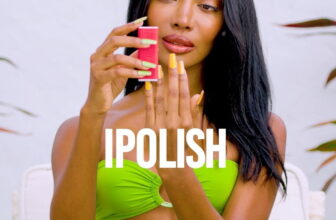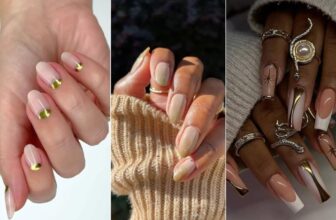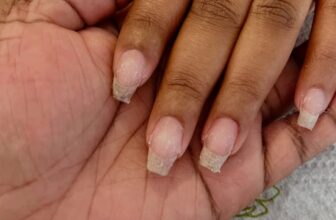A manicure isn’t just about pretty nails; it’s about treatments that boost nail appearance and health. Many manicure options include Russian, French, shellac, gel, acrylic, and dip powder.
However, not all methods last equally or need the same care, emphasizing the importance of choosing the right option for healthy nails. And, this is where dip powder manicures shine.
Unlike gel polishes that chip easily, dip powder manicures are incredibly durable, especially for active individuals. This type of manicure is quicker and less damaging than gel or acrylic nails.
But are they truly a better alternative for your nail care? Keep reading to find out.
What Are Dip Manicures?
Dip manicures, also known as dip powder nails or powder manicures, are a type of nail enhancement technique that involves using colored powder to create a durable and chip-resistant nail coating.
Dip powder nails are applied differently from gel nails and other traditional nail polish. Instead of using UV light, dip powder is applied in a three-step process: base/primer coat, color coat until desired coverage is achieved, and activator/top coat.
This method allows the nails to air dry, eliminating the need for UV light. After applying the special base or primer coat, each wet nail is dipped into colored acrylic powder or can be sprinkled or spooned over the nail for the desired effect.
An activator polish is then brushed on as a top coat to cure the formula. Once the top coat dries, your nails are ready to go. Dip manicures can be done on both natural and extended nails, offering versatility in nail styling options.
The application involves working in layers until the desired coverage is achieved, typically requiring two to three rounds of dipping.
How Long Does a Dip Manicure Last?
Dip manicures last a long time, usually between two to four weeks. This duration depends on factors like how fast your nails grow, how well the powder was applied, and how you take care of them. If done correctly with good products, dip powder nails can stay on without chipping or peeling.
However, things like using harsh chemicals, washing your hands often, or doing rough activities can make them wear out faster. To make them last longer, avoid soaking them in water for too long, or wear gloves when doing chores, and keep your nails and cuticles well moisturized with oil or lotion to prevent them from drying out or cracking.
Benefits of Getting a Dip Manicure
As already established, Dip Powder nails can stay looking good for up to four weeks without chipping or peeling, making them great for people who are active or tough on their nails.
Another benefit of dip powder nails is that they strengthen natural nails. The layers of dip powder protect nails from breaking and help them grow healthier. This is especially helpful for people with weak nails because dip powder gives them extra strength.
Dip powder nails also come in many colors, from subtle to bold. This variety allows for creative and unique nail designs that match personal style preferences.
Unlike gel nails that need UV light to dry, dip powder nails don’t require special equipment. This makes them safer for people worried about UV exposure during manicures.
Also, removing dip powder nails is easy. They can be soaked in acetone to remove the layers without harming natural nails, making it simple to switch to a new manicure when needed.
How to Remove Dip Powder Manicure
To remove your dip powder manicure at home, you can start by gently filing the top layer of the nails to break the seal. Then, soak cotton balls or pads in acetone and place them on each nail, wrapping them with aluminum foil to keep the acetone in contact with the dip powder.
After 15-20 minutes, remove the foil wraps and gently scrape off the softened dip powder with a cuticle pusher or orangewood stick. Avoid harsh scraping to prevent damage to your natural nails.
Once the dip powder is removed, buff the nail surface and apply cuticle oil or moisturizer to nourish your nails and cuticles.
Finally, wash your hands to remove any residue and apply a strengthening base coat for protection. If you’re unsure about the process, it’s best to seek professional help at a nail salon for safe and effective removal.
You May Also Like:
You Can Now Change Your Nail Colours with an App
January 13, 202617 Gold Nail Ideas You'd Want to Wear Now
December 27, 2025What You Need to Know About Nail Breakage: Causes and Solutions
December 22, 2025The Holiday Nail Polish Shades Everyone Is Wearing
December 17, 202514 Chic Ways to Wear Pantone's Cloud Dancer on Your Nails
December 9, 202511 Cute Halloween Nail Ideas To Enhance Your Spooky Look
October 8, 2025The Nail Shapes Everyone Will Be Wearing This Season
October 6, 202521 Skittle Nail Ideas That'll Give Your Manicure An Instant Upgrade
September 29, 202519 Wedding Nail Ideas That Are Irresistibly Gorgeous
September 24, 2025Europe is Banning Gel Nail Polish, Will Africa Follow Suit?
September 4, 2025Rose Water Nails Are the Ultimate Minimalist Manicure
August 19, 202520 Fall Nail Designs That Are Anything But Basic
August 12, 2025





